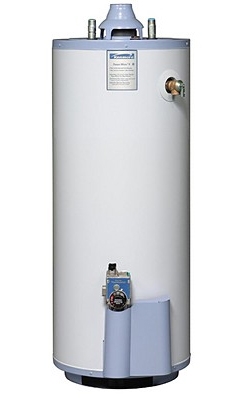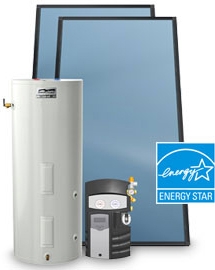Video: Water Heater Maintenance
Tank & Tankless Water Heaters
Based on the manufacturer’s suggested service life, the life expectancy of a water heater is about 8 to 12 years. That varies with the location and design of the unit, quality of installation, maintenance schedule and water quality.
If your water heater is more than 10 years old, leaks around the base of the tank, and / or works erratically or not at all, it’s probably time for replacement.
Choosing a new water heater is an important decision, one that you only have to make every ten or fifteen years—so it’s important to choose one carefully. Most households use 15 to 25 percent of their home energy to heat water. Before you purchase a new water heater, educate yourself about the options available so that you can quickly choose the most efficient unit that meets your needs if your current unit fails.

Tank-How it works
The tank is equipped with insulation to keep water warm between heating cycles. When a hot water tap is opened, cold water enters the tank through the dip tube and the drop in temperature triggers the thermostat. As the water at the top is replaced by cool water, the temperature drops. When the tap is turned off, the heating elements continue to carry current until the thermostats are satisfied.
Pros: Water is kept hot and ready for use at all times in insulated storage tanks with capacities typically ranging from 20-80 gallons. Easiest installation and replacement. Lowest first costs.
Cons: Standby heat loss. Can run out of hot water. Higher life cycle costs. Tanks are large and heavy.

Tankless-How it works
Water is circulated through a large coil and is heated only on demand using gas or electricity. According to Energy.gov, “For homes that use 41 gallons or less of hot water daily, demand water heaters can be 24%–34% more energy efficient than conventional storage tank water heaters.”
Pros: Runs only when needed, offering the potential to save energy. Small and space saving; typically wall hung. Lower life-cycle costs. Endless hot water.
Cons: Higher up-front cost. Complicated Installation. Electricity required for most models to operate. Limitations on the number of fixtures that can simultaneously use hot water.

Solar Water Heaters-How it works
Cold water is moved via a pump from a water tank and travels through solar collector in a solar panel. In the process, it is heated up by the power of the sun hitting the solar collectors. This heat is then carried away from the solar collectors by the water returning to a storage tank.
Pros: Increases equity in your home. Solar energy is clean and environmentally friendly. Requires little maintenance.
Cons: The initial investment is higher than other water heater systems. The efficiency of solar powered systems is rather dependent on sunlight resources. In colder climates where heating or electricity needs are higher, the efficiency is smaller.

